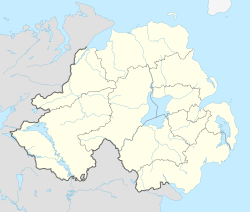Killytoney
Killytoney | |
|---|---|
| Irish transcription(s) | |
| • Derivation: | Coill an Tonnaigh |
| • Meaning: | "Wood of the stockade" |
 | |
| Coordinates: 54°47′46″N 6°41′53″W / 54.796°N 6.698°W | |
| Sovereign state | United Kingdom |
| Country | Northern Ireland |
| County | County Londonderry |
| Barony | Loughinsholin |
| Civil parish | Kilcronaghan |
| Plantation grant | Drapers Company |
| First recorded | 1609 |
| Government | |
| • Council | Mid Ulster District |
| • Ward | Tobermore |
| Area | |
| • Total | 208.59 acres (84.42 ha) |
| Irish grid ref | H8395 |
Killytoney (locally [ˌkʲïləˈtӧni], from Irish Coill an Tonnaigh, meaning 'wood of the stockade'[2]) is a townland lying within the civil parish of Kilcronaghan, County Londonderry, Northern Ireland. It lies in the center of the parish, and is bounded by the townlands of Calmore, Cloughfin, Coolsaragh, Gortamney, Killynumber, and Moyesset. It was apportioned to the Drapers company.[3]
The townland was part of Tobermore electoral ward of the former Magherafelt District Council, however in 1901 and 1926 it was part of Iniscarn District Electoral Division as part of the Draperstown dispensery (registrar's) district of Magherafelt Rural District.[4][5] It was also part of the historic barony of Loughinsholin.[3]
Etymology
The first element of the name Killytoney can be either from the Irish words coill (wood) or cill (church), which are indistinguishable in anglicistions due to their pronunciation. Despite this all previous authorities including Irish language scholar John O'Donovan support the derivation from coill.[2] O'Donovan also postulated that the second element is derived from "Tonnaig" (sic), meaning "mound" or "rampart". The Place-Names of Northern Ireland project agrees with this derivation citing that a rath formerly lay within this townland, and that a stockade may have been part of this structure or near it.[2]
History
|
|
| ||||||||||||||||||||||||||||||||||||||||||||||||||||
See also
References
- ^ Northern Ireland Environment Agency. "NIEA Map Viewer". Archived from the original on 24 November 2011. Retrieved 27 January 2012.
- ^ a b c Toner, Gregory: Place-Names of Northern Ireland, page 128-9. Queen's University of Belfast, 1996, ISBN 0-85389-613-5
- ^ a b Notes on the Place Names of the Parishes and Townlands of the County of Londonderry, 1925, Alfred Moore Munn, Clerk of the Crown and Peace of the City and County of Londonderry
- ^ a b c d HistPop; Area, houses, and population, Vol. III [Part 2], Ireland, 1901 Page 34
- ^ a b c d HistPop; County and County Borough of Londonderry, 1926, page 24
- ^ a b c d e f HistPop; Area, population and number of houses, Vol. III, Ireland, 1881, page 698
- ^ HistPop; County of Londonderry, 1851, page 241
- ^ Place Names NI - Killytoney



